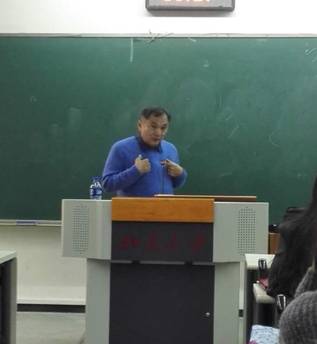Peking University, Nov. 10, 2016: On November 9, 2016, Jaime A. FlorCruz, the CNN’s former Beijing Bureau Chief and Correspondent, returned to Peking University and delivered a speech on “My Journey as a Journalist” in the Second Teaching Building.

Jaime making his speech
Jaime was born in the Philippines in 1951. At the age of 20, he traveled to China with some friends. During his stay in China however, a coup was staged in the Philippines. As he was one of the student leaders and objected to the coup, Jaime was forbidden to go back home and was deprived of his passport, so he had to stay in China. Jaime worked in several places in China, and in 1977, he was admitted to Peking University. After graduation, he joined TIME magazine’s Beijing Bureau in 1982. Later in the 2000s, he worked for CNN as its Beijing Bureau Chief and Correspondent. He retired from network in 2014. Since Jaime first came to China, he has been witnessing great changes. “I am also part of the changes,” said Jaime in his speech.
In his speech, Jaime shared with the audience his experience as a reporter and a journalist. He attaches much importance to objective reporting. In order to be objective, he thinks it is vitally important to keep a balance between reporting and advocacy. When it comes to the speed of news reporting, Jaime points out that to be quicker may not always be better. As he puts it, “We have to make sure they are truthful and right.” In addition, he pays special attention to ethics in reporting. He says it is forgivable to have wrong names or to make grammatical mistakes, but if you lose ethics, you may lose your job.
With curiosity about Jaime, who is a China expert, the audience raised numerous questions. When asked about the role of media in the U.S. presidential election of 2016, he said most of U.S. media are liberal-minded, though some of them may show some preferences. For instance, the media usually gets the voice of one side first, and for the sake of balance, they also get the voice of the other side, even if they hate it.
"My standard of good story in China is what is talked about by Chinese people over the dinner table," Jamie said. He tells the audience that his colleagues may have different ideas about what is going on in China. He has tried to change the tone of their reporting and the direction in which they observe China. “I win some, and I lose some.”
On his identity, Jamie said, “I worked for U.S. media, but if you ask where I am from, I would tell you Beijing, but I never forget that I am Filipino.”
At the end of his speech, he said that he hopes “at least” some of the students present at the lecture would devote themselves to journalism.
Reported by: Xie Changli
Edited by: Gan Zhonghao
